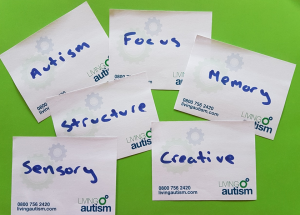Why do HR Managers need autism awareness training? Misunderstandings that could lead to fallouts between colleagues, disciplinaries and possible dismissals could be reduced if a measure of understanding is present of this ‘hidden disability’.
It is also important to remember that employees with an autistic spectrum disorder, including Asperger’s Syndrome, can bring excellent qualities to the workplace. These qualities can be missed if the employee is not appropriately supported from a lack of autism awareness.
Autism affects every individual differently. Every individual has their own personality, their own strengths and weaknesses and they have their own difficulties to overcome just like everyone else. However, hurdles can be overcome, anxieties and resultant absenteeism can be reduced and time can be focused more on enabling and empowering the individual rather than disciplining them.
How can autism awareness training help?
Autism awareness training can help right from the point of recruitment. Often, applications are received from prospective employees who are well-educated and seem to excel in their chosen field. However, difficulties could arise during the interview stage.
Some behaviours which might be encountered during the interview stage include:
- appearing overly anxious
- avoiding eye contact
- taking time to respond to questions
- seemingly unable to work within a group situation
These behaviours could be misinterpreted by the interviewers if they do not understand how autism can impact on individuals. They could dismiss this prospective employee as unsuitable and miss out on some of the qualities they could bring, such as –
- excellent memory
- precision and attention to detail
- mathematical and technical skills
- musical and creative skills
- a preference for following instructions and abiding by rules
- sticking to structured programmes
- direct, open and honest
- dealing with projects which have a clear beginning, middle and end
How can autism impact within the workplace?
Just as some behaviours can be misinterpreted during the recruitment stage, the same can hold true within the workplace. Some people with autism/Asperger’s Syndrome can come across as –
- abrupt
- absent-minded
- aggressive
- anxious
- disorganised
- eccentric
- lost in their own world
- rude
- self-centred
- thoughtless
However, with some understanding these perceptions can be changed and the individual can be helped appropriately to change the distressing behaviour if that is deemed to be necessary.
What are some of the characteristics of autism?
Autistic Spectrum Disorders (including Asperger’s Syndrome) are a spectrum of disorders that are neurodevelopmental and lifelong. The autism condition itself is not a learning disability although it can present obstacles to aspects of social and communication learning. The difficulties lie in the lack of understanding of the social nuances of communication and behaviour, dealing with unknown situations and people, problems in thinking through sequences or of consequences to actions, inabilities in forming overarching concepts from detailed information, inabilities to see things from another’s perspective and dealing with sensory differences.
Some characteristics of autism are –
- sensory differences
- differences in social communication
- differences in need for structure and routine
Sensory differences
People with autism can be either hyper-sensitive or hyposensitive. If they are hyper-sensitive then the senses can be more honed than usual and, therefore, sounds can seem louder, lights brighter, smells and tastes stronger; and touch keener; thus, the person can receive environmental information at a much greater intensity. If they are hypo-sensitive, they cannot process sensory input as effectively and, for example, might not feel hot water to the extent that they might get scalded. These sensory differences can mean –
- an acute sense of hearing or not being able to hear clearly
- an ability to see in detail or inability to see the whole because of too much detail
- a discriminatory sense of smell and taste
- an extreme sensitivity to touch, textures and pressures or a need for stronger textures and increased pressure
Differences in social communication
People with an autistic spectrum disorder can have a high level of vocabulary aided by their excellent memory skills. However, they could find contextualizing of language and abstract language difficult to understand. Furthermore, whilst most people pick up social cues which are sometimes illogical or which are dependent upon ‘seeing’ the entirety of a situation and not just one aspect, people with Asperger’s could have some difficulty in detecting subtle and non-verbal communications. You might notice difficulties in –
- engaging in or understanding small talk

- understanding body language and facial expressions
- understanding sarcasm, jokes, irony (those with autism could have a tendency to be very literal in their understanding)
- understanding verbal communication without corresponding verbal cues, for example: notes, diagrams.
- showing empathy and understanding of others
- keeping eye contact
- speaking untruths in order not to offend; understand personal space
- understanding social rules which are not based upon logic
- understanding the complexities of inter-personal relationships
Differences in need for structure and routine
Flexibility of thought is the ability to hazard a guess at the unknown, to cope with the unexpected, to act upon a whim. The sense of security brought on by the known can lead to the following:
- becoming obsessed with an interest, place or person
- becoming anxious by change, spontaneity and unplanned events
- experiencing difficulties in coping with the unknown (new people, new places, new situations)
- experiencing difficulties in remembering sequences without prompts, such as: diary, personal planner, alarm
- experiencing difficulties in comprehending abstract concepts (e.g., formality, spontaneity, fun, anxiety)
- reluctance in using own initiative
Training
Whether a person actually has a diagnosis of autism or experiences the same hurdles, the most difficult aspect of this way of being is the lack of understanding of the people around them. Some basic training for HR Managers would be most beneficial.
To find out about training for HR Managers or Department contact:
training@livingautism.co.uk
Trainers are based in the United Kingdom; however, training packages can be negotiated for other countries as well. Please contact for further information.



